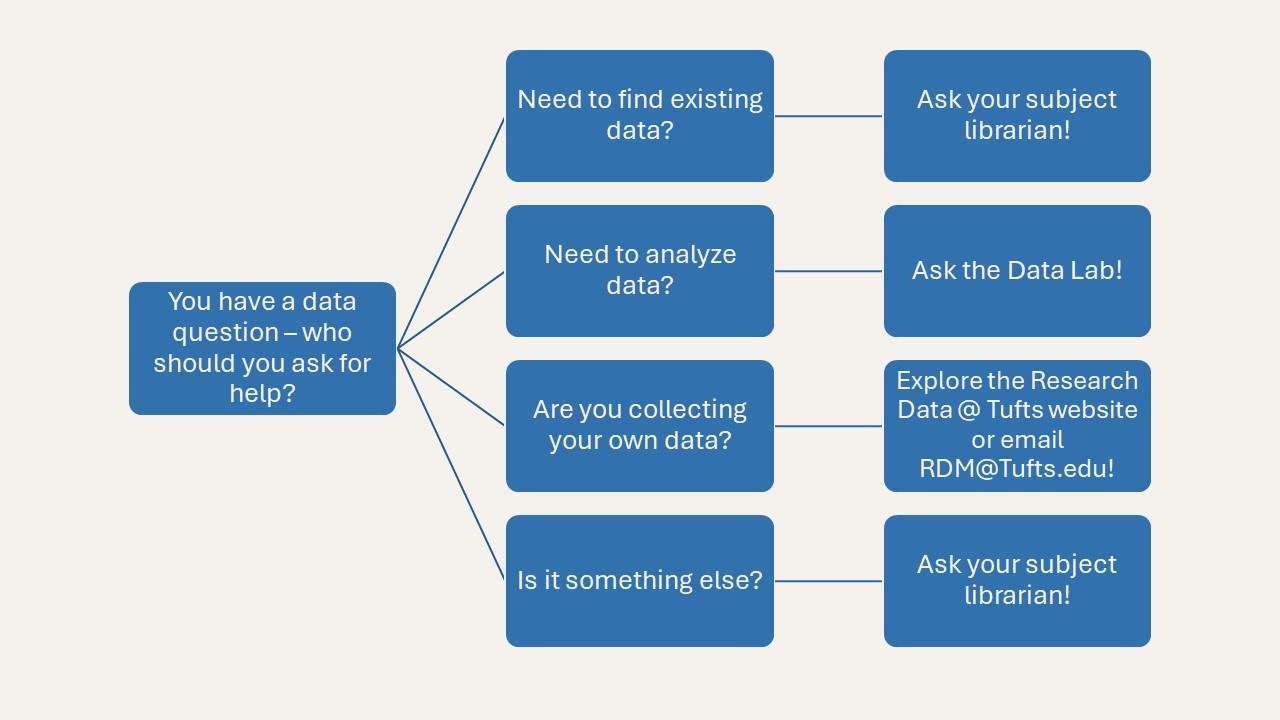Data services on campus

Need help finding data?
Are you looking for existing data for a project or assignment? Reach out to your subject librarian or Ask Us.
You can search for social science data by topic using the Social Science Data Research Guide. Is a link broken? Please let your subject librarian know.
You can search for archived data, including U.S. federal data, using the Archived Data Research Guide.
Need help analyzing data?
For support analyzing data, doing GIS, learning software, or advanced data visualization, contact the Data Lab.
Need help with original data?
Explore the Research Data @ Tufts site for assistance with everything from managing to storing, describing, citing, preserving, and sharing data. You can also email your question to RDM@tufts.edu.
Is your question related to your original research with human subjects?
Please contact the Social, Behavioral, and Educational Research IRB (SBER IRB). If your project is for class, please also check with your professor to see if they have already checked in with the SBER IRB on your behalf.
Is your question related to funding your original research?
Explore the Office of the Vice Provost for Research's (OVPR) site or ask a faculty member for help contacting the OVPR's Local Research Administrators (LRA).
Tips for finding data
- To narrow down the data that would answer your research question, consider the following steps:
- Where do you want to find data from? A particular geography? Don't consider only location though: what unit size do you need: in other words, do you want data for an entire country as a country, or broken down by state, county, etc? This is often the biggest limiter of data.
- When do you want data from? Do you want a snapshot (ex. population in 1999) or do you want longitudinal data that you can compare over time? Make sure the same question is being asked of the same population.
- Who do you want data about? The entire population? A particular age, gender, socioeconomic class, race, or other demographic group? Are any of the groups you want to research protected or vulnerable? If so, it will be harder to find data, and you will need to be particularly cognizant of your responsibility as a researcher to do no harm.
- What variables could answer the research question? This is intentionally after the three previous questions, because often there are multiple variables that could address your question. If you want to know income, for example, you could look for self-reported income, tax filings, or a proxy like car model owned (which correlates closely with wealth). To find out what the variable actually means, check the codebook, which will describe how that question was gathered and what it actually represents. Also ask what type of data: do you need microdata or aggregate data?
- Why would someone gather this data? What biases does that introduce? Is Coca Cola funding this research on sugar? If you're having trouble finding data, this can also be used to identify stakeholders who may gather data, which you can then intentionally search for.
- How is this data gathered, and how does that affect your analysis? If people self-report height and wealth, for example, research demonstrates they are consistently over-estimating.